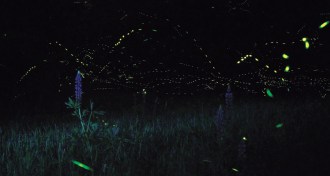Uncategorized
-
 Tech
TechWith two robotic fingers, humans get a helping hand
Mechanical fingers grasp like the real thing.
By Meghan Rosen -
 Animals
AnimalsParchment worms are best pinched in the dark
Meek tube-dwelling worms have strange glowing mucus and build papery tubes.
By Susan Milius -
 Science & Society
Science & SocietyBook delves into Scientific Revolution way beyond Galileo
‘Voyaging in Strange Seas’ shows that modern science was built not just by giants but by hundreds who explored all realms of science.
-
 Health & Medicine
Health & MedicineBoot camp bug
Adenoviruses, which cause respiratory illnesses including some colds, plague boot camps.
By Nsikan Akpan -
 Materials Science
Materials Science‘Stuff Matters’ explores the science behind everyday objects
Author Mark Miodownik explores why everyday materials look and behave the way they do.
-
 Science & Society
Science & SocietyAn app to track firefly flashings
This summer, you can contribute to citizen science by tracking lightning bugs in your backyard.
-
 Genetics
GeneticsGene activity change can produce cancer
Scientists have long thought that epigenetic changes, which alter gene activity, can cause cancer. Now they have demonstrated it in a mouse experiment.
-
 Science & Society
Science & SocietyFeedback
Readers discuss mammograms, crops in a warming climate and the impacts of a recession on developing personalities.
-
 Astronomy
AstronomyListening in on cosmic messages
Yet to be deciphered, fast radio bursts represent the latest messages from space with the potential to tell us more about the cosmos.
By Eva Emerson -
 Astronomy
AstronomySearching for distant signals
Fast radio bursts are bright, brief and seem to come from very far away. Astronomers are pointing major telescopes skyward to solve the puzzle of these cryptic signals.
-
 Health & Medicine
Health & MedicineLong-term Parkinson’s treatment sheds bad rep
Prolonged used of levodopa doesn’t increase the severity of side effects from the Parkinson’s drug, new research shows.
-
 Earth
EarthWonders of the northern lights
An Icelandic aurora catches a photographer’s eye and a contest prize.